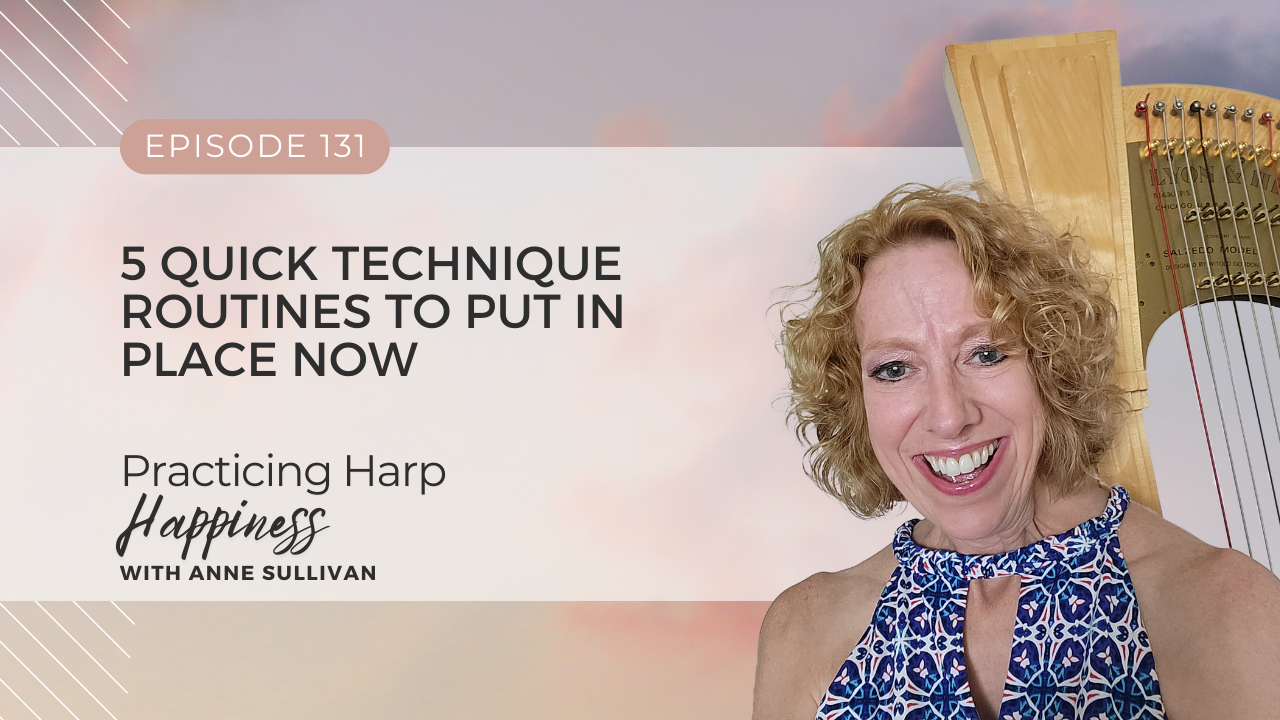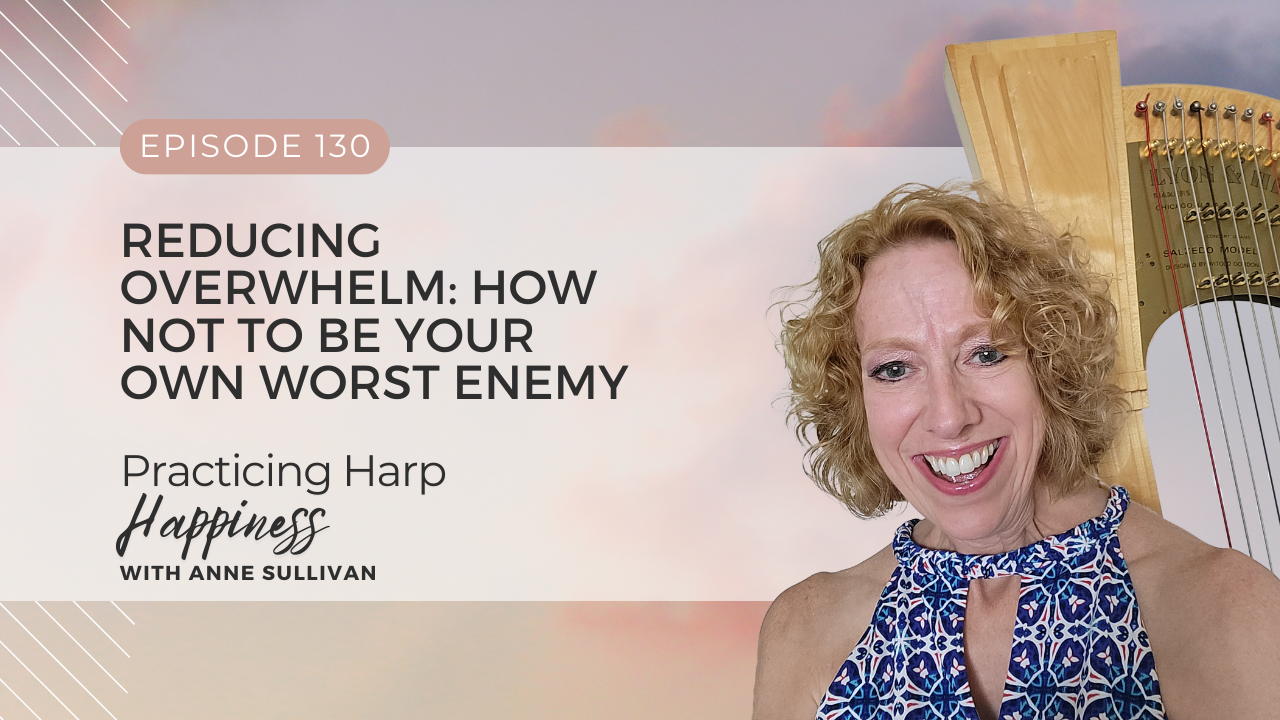Practicing Harp Happiness
#139: 7 Ways You Could be Using Your Practice Time Better

At its most fundamental, music is sound over time. When you take away the rich harmonies, soaring melodies, complex structures and intricate rhythms, that’s all you have left: sound over time. It doesn’t sound very creative or artistic, but those two elements are the basis of all music. How any single performer combines them is where the artistry lies.
However, that kind of time, the meter and rhythm, isn’t our topic for today. The kind of time management I want to explore with you today is more about the practical side of our harp experience than the artistic side. It’s about your practice time: how you spend it, what you focus on and how you set your intentions for the day or for the week.
We’re also going to talk about the time it takes you to learn a piece. I am frequently asked how long it should take to learn a piece, and it’s a question without a simple answer. There are numerous factors to consider, including the amount of time you have to practice and your current skill ...
#138: Creating True Confidence; Why the Little Engine that Could Got It Wrong

The Little Engine That Could was just plain lucky. If you remember that children’s book, when the little engine had to take over for the bigger engines to pull the train loaded with toys over the mountain, he kept telling himself, “I think I can,” even though it seemed clear he was much too small to succeed. While the “I think I can” strategy worked for the little engine, in the real world that mindset is responsible for more failure, frustration and disappointment than we are led to believe. Thinking positively is not what is necessary for a positive result. It’s not a bad thing, but it’s not the only thing, and if it’s not grounded in reality it can be damaging.
You don’t achieve confidence by trying to build confidence itself. True confidence is a natural result of properly directed actions along with a positive mindset. Without the actions and the experience that comes with following through on those actions, a confident attitude will let you down nearly every time. You need th...
#137: How Not Setting Goals May Save Your Harp Playing

Happy New Year! It’s the first morning of a new year and I am feeling, as I do every new year, that sense of excitement and possibility that inhabits those empty calendar pages. I can hardly wait to see what 2024 will bring.
Since this podcast is going live on New Year’s Day, I thought it was particularly appropriate to talk today about goals. We talk about harp goals a lot at Harp Mastery® but today I actually want to elevate our viewpoint and look at harp playing goals with a broader perspective.
SMART goals - specific, measurable, achievable, relevant, time-based - have been the gold standard of productivity experts for a while. Those five criteria combine in a way that makes success look almost like a mathematical certainty. They feel powerful because they are so concrete.
But music isn’t like that. Music is about creativity. It’s not about following rules, it’s about choosing which ones you want to follow. It’s not about creating cookie cutter results; it’s about developin...
#136: A Holiday Harp Music Mix - Just For You

A special holiday music mix just for podcast listeners!
The program:
- Two from Messiah
Pastoral Symphony/He shall feed his flock
Arranged by Anne Sullivan
- Greensleeves, from Anne’s Break Forth CD,
Arranged by Anne Sullivan - Coventry Carol
Arranged by Anne Sullivan - Pat-a-pan
Arranged by Anne Sullivan - In Dulci Jubilo, from Anne’s Break Forth CD,
Arranged by Anne Sullivan - Largo from Winter, from Anne’s Break Forth CD,
Arranged by Anne Sullivan - 12 Days of Harpiness
Arranged by Anne Sullivan
Links to things I think you might be interested in that were mentioned in the podcast episode:
- Listen to our Harpy Christmas playlist on Spotify featuring music by Anne Sullivn and other harpist performers.
- Find some great holiday sheet music or a CD in our shop.
- Harpmastery.com
Get involved in the show! Send your questions and suggestions for future podcast episodes to me at [email protected]
#135: My Year in Review: Remembering What Really Matters

The year-end wrap has become a hot trend. The worthy practice of reflecting on the year that is nearly over and the new one about to start is no longer simply a quiet moment with a cup of tea and a journal. It’s an opportunity for businesses to go public with their successes. We at Harp Mastery® have jumped on the bandwagon, too. It’s fun to look back and see what we’ve accomplished. It’s important, perhaps even more so, to see where we missed the mark. Somehow, though, those aren’t the numbers that show up on social media. We like to count the wins.
But this episode isn’t about what Harp Mastery® has done. After all, this isn’t a business podcast. This podcast is about you, me and our harp playing. And that’s what this episode is about too.
I want to share with you my own system for looking back, for remembering what my year was like. I start in the same way you may, by looking back at my calendar week by week and month by month. But my objective isn’t to see how many goals I hav...
#134: Creating Stillness When You Need It Most

As I look back over 11 years of blogging and podcasting, there are some trends I notice, topics I talk about with regularity and even predictability according to the seasons. Of course, it’s not a surprise that in December one of the topics that is on my mind - and I’m guessing on yours too - is about keeping your sanity during the holiday rush. Last week’s podcast, The Christmas Snowball, episode 133, dealt with the holiday music onslaught, and a few episodes before that, episode 130, I talked about preventing overwhelm. Timely topics, yes, but today, I’d like to look at this from the other side. I want to talk about stillness.
Here’s an example of the value of stillness. I was in an opera orchestra rehearsal with a conductor who was famous for his temper. There were days when he was complimentary to the players, but on the days when no one could do anything that pleased him, he was not shy about venting his displeasure. Sometimes the entire orchestra fell under his wrath; sometim...
#133: The Christmas Snowball: How to Handle Last-Minute Requests

Be prepared, the famous Boy Scout motto. I’m thinking that Boy Scouts have nothing on harpists when it comes to being prepared. We harpists have preparation down, whether it is preparing our music, or stocking spare strings or packing our harp bag. However, there are times when even the best preparation doesn’t help, and you might be about to experience one of those times. Let’s call it the “Christmas Snowball.”
The Christmas Snowball shows up when the church music director decides that since you are playing the harp for the service and you’re there anyway, it would be a shame not to use the harp for every musical moment possible. So what started as a simple request - would you come and play the harp for one anthem with the choir on Christmas Eve? - snowballs into an additional anthem, various choral responses during the service, three carols with the congregation, a prelude selection or two, and of course, playing Silent Night during the candlelighting. If you’ve played for a Chri...
#132: What Your Favorite Harpist Needs: A Gift List with a Difference

Long, long ago in what seems like a galaxy far away, there was no Cyber Monday. There was barely even a Black Friday. We shopped in stores, not on the yet-to-be-imagined internet.
And for the children who were dreaming of holiday presents, there was the Sears catalog, the “Wish Book” edition. If you are an American of a certain age, you are nodding your head right now, but if you have no idea what I’m talking about, I’ll explain.
Sears is a department store chain that was founded in 1892. It was in the beginning exclusively a mail order business, and the Sears catalog was an important resource for shoppers all over the country, but particularly in rural areas that had limited access to stores. But, the special “Wish Book” edition, first printed in 1933 and released every year at holiday time, was the ultimate catalog shopping experience. It ceased publication in 1993, but at its peak, the catalog had over 600 pages with more than 100 pages devoted to toys. My brother and I waited...
#131: 5 Quick Technique Routines to Put In Place Now

Tell me if this sounds familiar. You suddenly realize that everything is quiet and you have 20 minutes all to yourself. Sure, you could sit down with a book and a cup of tea. Or you could spend that 20 minutes practicing. You decide your harp is calling you, so you sit on the bench and look at the music on your stand. But where do you start?
You may have had days like that. I know I have. Those 20 minute segments are valuable little chunks of practice time, but obviously that’s not enough time to get everything done. If you’re used to having an hour or more to practice, that 20 minutes is frustratingly short. Of course, I’m just using these time frames as an illustration. Your regular practice time and your available time might be different, but the idea is the same. When you don’t have as much practice time as you are used to, you have to find a way to make do with what you’ve got.
When we start to prioritize what needs to get done, the first thing we often jettison from our pra...
#130: Reducing Overwhelm: How Not to Be Your Own Worst Enemy

As of today, the day this podcast episode goes live, it is exactly six weeks until Christmas. As I said that, a little shiver ran down my spine. What was your reaction? Maybe you are channeling your inner child who can hardly wait for Christmas and you were jumping up and down.
But I wouldn’t be surprised if you were a little annoyed or even felt a flutter of anxiety at being reminded of how fast the holiday season is approaching. Those Christmas songs that already form the shopping soundtrack in every store are more than a little irritating to me. They seem to bring out my inner Scrooge and it’s mostly because they just remind me of everything I still have to do to get ready. In a word, it feels overwhelming.
Of course, the feeling of overwhelm when it comes to your harp playing isn’t just a holiday phenomenon. Overwhelm poses a challenge for us every day. There is always a spot that needs more work, some technical drill we should be doing, new music we want to learn, old pieces...

